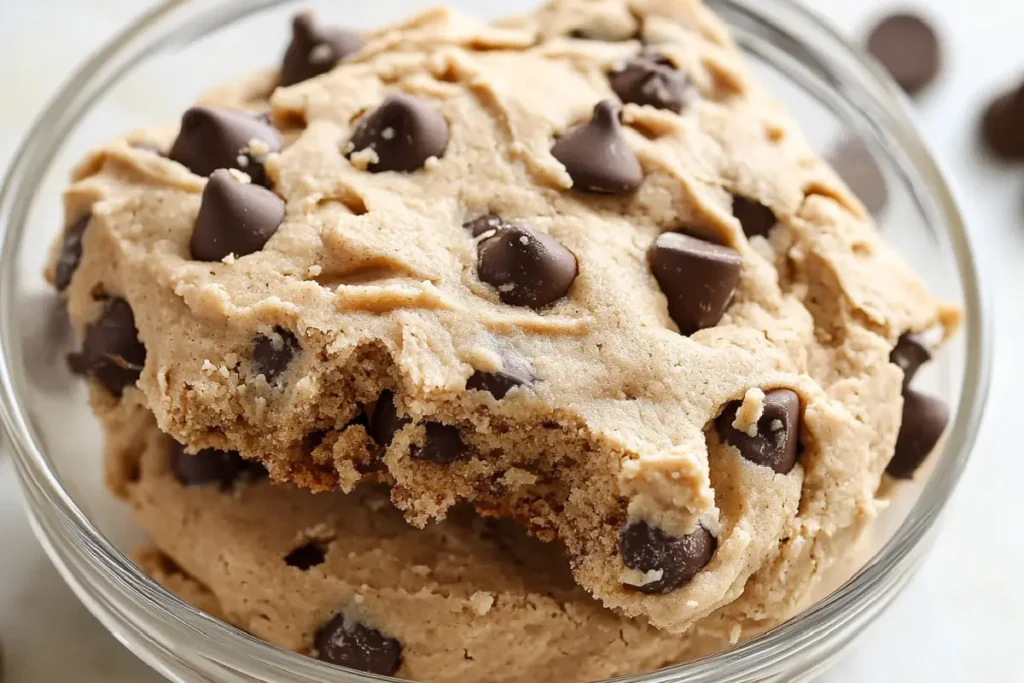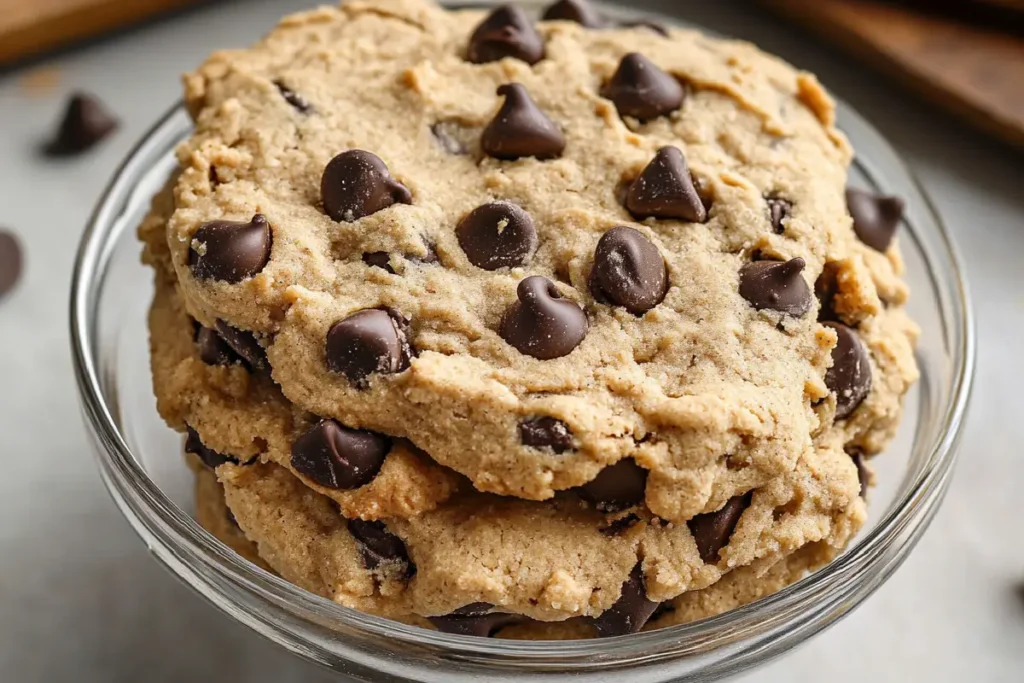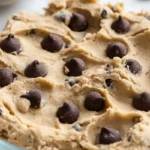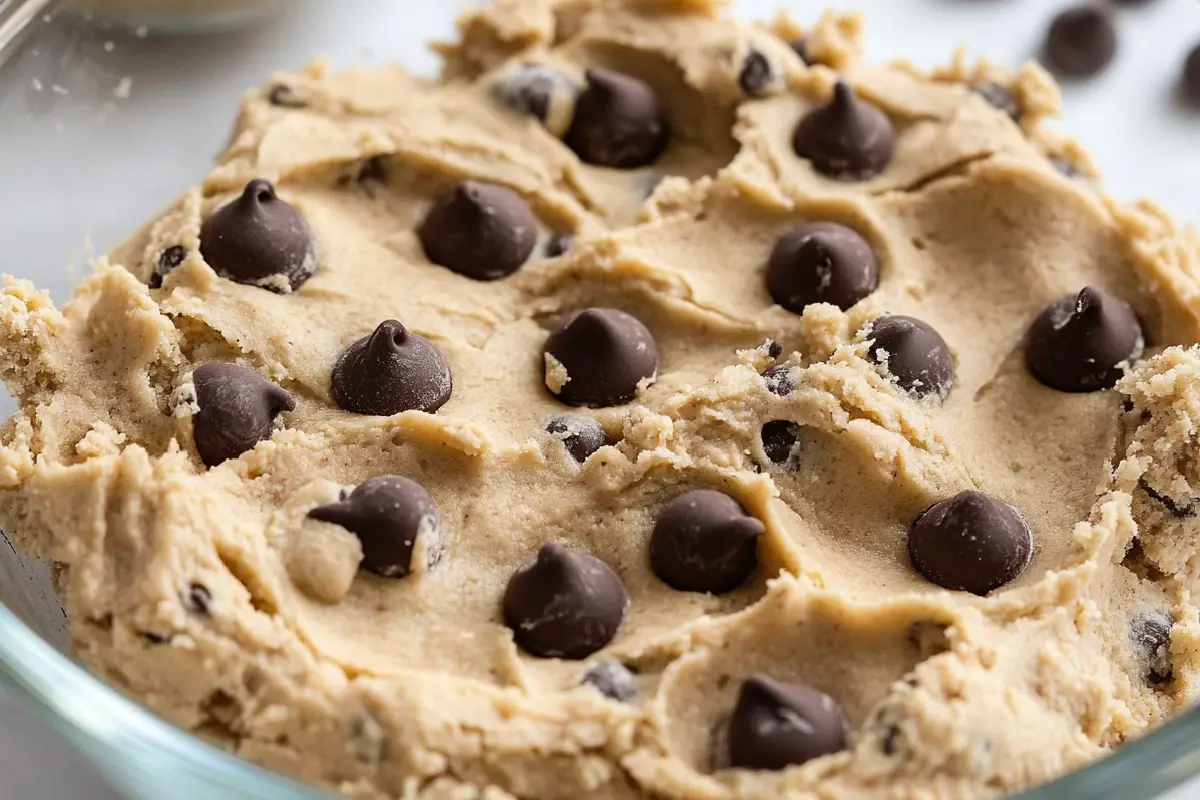Table of Contents: What Protein Powder Is Best In Cookies?
Introduction: What Protein Powder Is Best In Cookies?
Ever bitten into a protein cookie that tasted like chalk wrapped in regret? You’re not alone. The struggle to bake cookies that are both healthy and delicious is real—but it ends here. What Protein Powder Is Best In Cookies? We’ve cracked the code to create soft, chewy, actually crave-worthy protein cookies that’ll fool even the pickiest eaters. Picture this: a warm, gooey chocolate chip cookie with 15 grams of protein per serving, ready in under 20 minutes. No weird aftertaste, no cardboard texture—just pure bliss.
Fun fact: The average American eats 35,000 cookies in their lifetime. Why not make a few of those actually good for you? Unlike our popular Fudgy Protein Brownies (which are a hit for chocolate lovers), these cookies are quicker to whip up and perfect for sneaking protein into snacks, lunchboxes, or midnight cravings. Grab your apron—let’s bake guilt-free magic!
What is “What Protein Powder Is Best In Cookies?”
Why the mouthful of a name? Because these aren’t just any cookies—they’re a protein-packed revolution! Think of them as your gym buddy’s dream dessert: chewy, sweet, and secretly wholesome. Legend says the recipe was born after a gym-goer’s meltdown over crumbly “health” cookies. (Spoiler: They tossed the chalky powder, found the right one, and lived happily ever after.)
As the saying goes, “The way to someone’s heart is through their stomach”—and these cookies are your shortcut. Whether you’re winning over picky kids, meal-prepping for gains, or just craving a smarter snack, this recipe is your golden ticket. Ready to bake your way to hero status? Let’s go!
Why You’ll Love This Recipe

- Chewy Perfection, Zero Compromise
Forget dry, crumbly disasters. These cookies stay soft for days, thanks to the right protein powder (spoiler: whey isolate wins). - Wallet-Friendly Wins
Store-bought protein cookies cost 3+each.Thisbatch?Under3+each.Thisbatch?Under0.50 per cookie—and you control the ingredients. - Flavor Explosion
Vanilla protein base + melty dark chocolate chips + sea salt sprinkle = a trio that’ll make your taste buds sing.
Love our No-Bake Protein Bars? These cookies are their fun, oven-loving cousin. Whip up a batch and taste the hype!
How to Make Protein-Packed Cookies
Quick Overview
- Prep Time: 10 mins | Cook Time: 10 mins | Total: 20 mins
- Ease Level: Beginner-friendly, one-bowl recipe.
- Key Perk: Customizable flavors (add peanut butter, nuts, or sprinkles!).
Key Ingredients
(Serves 12)
- 1 cup oat flour (or almond flour for gluten-free)
- ½ cup vanilla whey protein powder (see top 5 picks below!)
- ¼ cup melted coconut oil
- ⅓ cup maple syrup
- 1 tsp vanilla extract
- ½ cup dark chocolate chips
- Pinch of sea salt
![Ingredients shot: Oat flour, protein powder, chocolate chips, and coconut oil in rustic bowls.]
Step-by-Step Instructions
- Mix Wet Ingredients: Whisk coconut oil, maple syrup, and vanilla.
- Add Dry: Fold in oat flour, protein powder, and salt. Don’t overmix!
- Fold In Chocolate: Gently stir in chocolate chips.
- Scoop & Chill: Roll dough into 12 balls, freeze for 10 mins (prevents spreading).
- Bake: 350°F for 8-10 mins—edges golden, centers soft.
- Cool: Let sit 5 mins before devouring.
What to Serve With Protein Cookies
- Drinks: Cold almond milk, espresso, or a post-workout shake.
- Sides: Fresh berries for a tart contrast or Greek yogurt dip.
- Dessert Hack: Crumble over vanilla ice cream!
Top Tips for Perfect Cookies
- Protein Powder Matters: Use whey isolate for best texture (plant-based? See picks below).
- Chill the Dough: Skip this, and you’ll get cookie pancakes.
- Underbake Slightly: They firm up as they cool!
Storing and Reheating Tips
- Store: Airtight container for 1 week (layer with parchment).
- Freeze Dough: Roll into balls, freeze up to 3 months. Bake straight from frozen (+2 mins).
- Reheat: 10 secs in microwave for that fresh-from-oven gooeyness.
5 Best Protein Powders for Cookies
- Optimum Nutrition Gold Standard Whey (Best Overall)
- Orgain Organic Plant Protein (Top Vegan Pick)
- Dymatize ISO100 (Ultra-Clean Texture)
- PEScience Select Protein (Baker’s Favorite)
- Ghost Whey (Flavor Variety Champ)
FAQs: What Protein Powder Is Best In Cookies?

1. Can I substitute protein powder for flour in cookies?
Nope! Protein powder isn’t a 1:1 swap for flour—it’s drier and lacks gluten. Always use a mix (like our recipe’s oat flour + protein blend) for the perfect chewy texture.
2. Why did my protein cookies turn out dry/crumbly?
This usually happens with plant-based powders (they absorb more moisture) or overbaking. Fix it: Add 1-2 tbsp milk or applesauce to the dough, and pull cookies out when edges just turn golden.
3. What’s the best vegan protein powder for cookies?
Orgain Organic Plant Protein (our #2 pick!) works wonders. For best results, pair it with almond flour and a flax “egg” to lock in moisture.
4. Can I use unflavored protein powder?
Absolutely! Just add 1 tsp vanilla extract + 2 tbsp sugar (or maple syrup) to the dough to boost flavor.
5. How do I store protein cookies to keep them soft?
Layer them with parchment in an airtight container. Pro tip: Toss in a slice of bread—it’ll absorb excess moisture and keep cookies chewy for days!
6. Can I freeze the dough?
Yes! Roll dough into balls, freeze on a tray, then transfer to a bag. Bake straight from frozen (add 1-2 mins to cook time).
7. Will whey protein make cookies taste chalky?
Not if you pick a high-quality brand (like Optimum Nutrition or PEScience). Avoid cheap powders with fillers—they’re the chalky culprits!
8. Can I make these gluten-free?
Yep! Swap oat flour for almond flour, and ensure your protein powder is certified gluten-free (Dymatize ISO100 is a safe bet).
Ready to Bake Smarter?
Whether you’re a macro-counter, busy parent, or dessert enthusiast, these cookies are your new MVP. Tag us on Instagram with your creations—we’ll feature the best ones! And don’t miss our Protein Pancakes guide for another breakfast win. Happy baking! 🍪💪

Best Protein Powder Cookies
- Total Time: 20 mins
- Yield: 12 cookies 1x
- Diet: Gluten Free
Description
Discover the secret to baking soft, chewy protein cookies that taste like dessert heaven! Learn what protein powder is best in cookies (we tested 5 top picks!) and whip up this easy, guilt-free recipe in 20 minutes. Perfect for snacks, meal prep, or satisfying sweet cravings!
Ingredients
- 1 cup oat flour (or almond flour for gluten-free)
- ½ cup vanilla whey protein powder (see notes for vegan swaps)
- ¼ cup melted coconut oil
- ⅓ cup maple syrup
- 1 tsp vanilla extract
- ½ cup dark chocolate chips
- Pinch of sea salt
Instructions
- Preheat oven to 350°F (175°C). Line a baking sheet with parchment paper.
- Mix wet ingredients: In a bowl, whisk coconut oil, maple syrup, and vanilla.
- Add dry ingredients: Fold in oat flour, protein powder, and salt until just combined.
- Fold in chocolate chips.
- Chill dough for 10 minutes (prevents spreading).
- Scoop dough into 12 balls, place on baking sheet, and flatten slightly.
- Bake 8–10 minutes until edges are golden.
- Cool 5 minutes before serving.
Notes
- Protein powder matters: Use whey isolate or Orgain plant protein for best texture.
- Vegan? Swap whey for plant-based powder and add 1 tbsp flaxseed + 3 tbsp water.
- Storage: Keep in an airtight container for 1 week or freeze dough balls for 3 months.
- Prep Time: 10 mins
- Cook Time: 10 mins
- Category: Dessert/Snack
- Method: Baking
- Cuisine: American
Nutrition
- Serving Size: 1 cookie
- Calories: 125 kcal
- Sugar: 6g
- Sodium: 45mg
- Fat: 7g
- Saturated Fat: 5g
- Unsaturated Fat: 12g
- Trans Fat: 1g
- Carbohydrates: 12g
- Fiber: 1g
- Protein: 8g
- Cholesterol: 10mg
Keywords: What Protein Powder Is Best In Cookies, protein cookie recipe, healthy dessert, easy protein snacks

